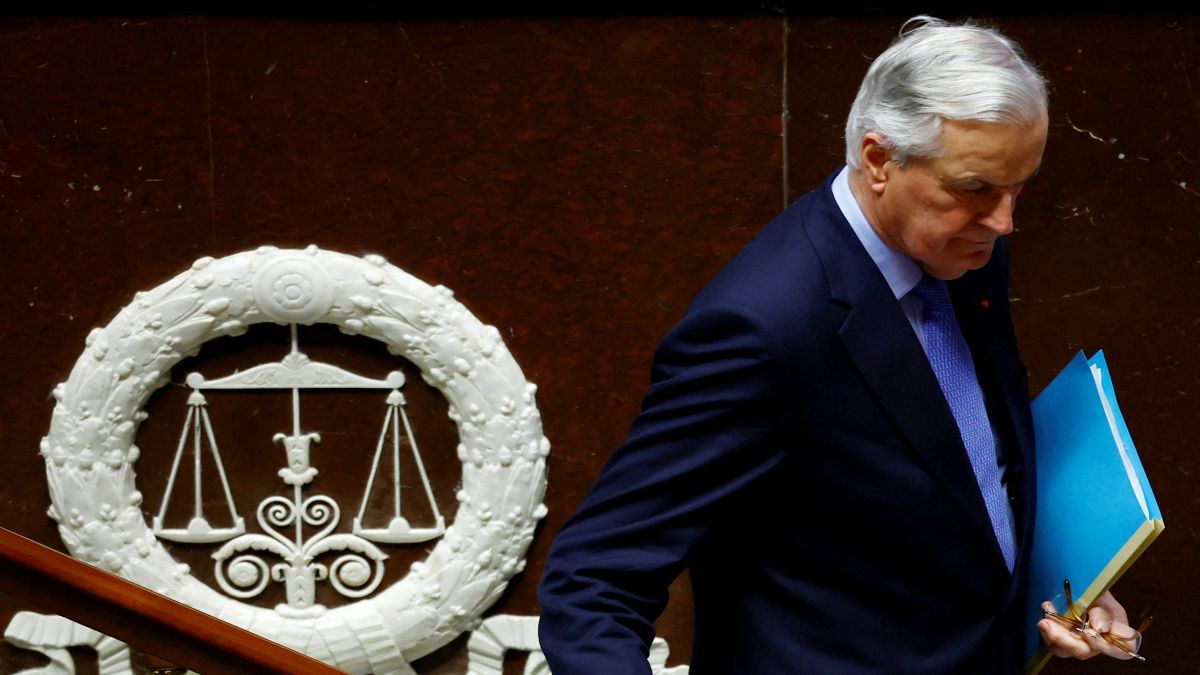When Michel Barnier took up the job of being France’s prime minister, it was believed that he could save the European nation. However, it seems that Barnier couldn’t be saved himself after French lawmakers voted to oust him in a historic no-confidence vote.
Barnier will now submit his government’s resignation to President Emmanuel Macron, earning him the title of being France’s shortest-serving premier since the Fifth Republic, the system of government in France from 1958. Following this, the president will address the nation (scheduled for 7 pm GMT) and have the tough job of picking a viable successor with over two years of his presidential term left.
Following the historic no-confidence vote against Barnier, far-right National Rally leader Marine Le Pen said she did not “consider this to be a victory”.
“The choice that we made was to protect the French people,” Le Pen said, adding that it was not made “with a light heart”. “There was no other solution but this one,” she said.
We decode what exactly happened though — starting from the no-confidence vote against Barnier to his ouster.
Who is Michel Barnier?
Michel Barner , the 73-year-old, is no stranger to French politics. Though he was brought in as PM in September by Macron, he has previous experience in the political arena.
Previously, Barnier served as foreign minister and twice as European Union commissioner in Brussels. He is best known internationally for taking on the job of negotiating Britain’s exit from the European Union on behalf of the bloc after the 2016 referendum. Firm and courteous in talks, and hugely respected by his team, Barnier won considerable kudos for his handling of the process.
Despite the odds stacked against him — he was leading a minority government — Barnier always exhibited calm, never losing his cool. Even hours before MPs voted to oust him on Wednesday (December 4), he maintained his calm, saying to the media, “I’m not afraid. I’ve rarely been afraid in my political life.”
Why was a no-confidence motion moved against Barnier?
Macron brought in Barnier as PM in September with the hope that the 73-year-old would be able to solve the country’s debt bomb and steady Macron’s administration. The country’s deficit is estimated to reach six per cent of gross domestic product this year and analysts say it could rise to seven per cent next year without drastic adjustments.
And that’s what Barnier was trying to do with the budget that would reduce France’s eye-watering deficits. On Monday (December 2), the 73-year-old PM used a constitutional measure, Article 49.3 , to push the government’s proposed social security budget without a vote. This decision angered the National Rally party and the left-wing alliance New Popular Front (NFP)
Barnier’s bill proposed €60 billion in tax hikes and spending cuts, which would help reduce the deficit to five per cent next year. There were also measures such as delaying pension increases, which sparked strong opposition from other party members.
Following this, Marine Le Pen said, “The French have had enough. We are proposing a motion of no confidence against the government.”
What happened at the no-confidence vote?
On Wednesday (December 4), both the Far Right and the left-wing New Popular Front coalition joined hands in ousting Michel Barnier and his government from power with a whopping 331 MPs voting for it. A minimum of 288 were needed.
The outcome marks the first time a French government has lost a confidence vote since 1962 and Barnier being the shortest serving PM since 1958. Besides him, Bernard Cazeneuve only served for five months and four days (155 days) in 2016-17. However, he knew his would be a short term as then French President Francois Hollande had announced that he wouldn’t run for a second term.
Barnier’s predecessor, Gabriel Attal also stayed only for six months and seven days (189 days) before his government resigned on July 16, 2024, following an election defeat.
Barnier speaking in his final address, warned lawmakers that their decision wouldn’t help the country and its finances. “This (deficit) reality will not disappear by the magic of a motion of censure.”
He said, “This motion of censure would make everything more difficult.” He further criticised Le Pen, saying their failure to agree on terms had showed that “we do not have the same idea of patriotism and of sovereignty”.
Following the no-confidence motion passed against Barnier, calls for Macron to go also grew louder. Mathilde Panot, the head of the parliamentary faction of the hard-left France Unbowed (LFI) party told reporters, “We are now calling on Macron to go”, urging “early presidential elections” to solve the deepening political crisis.
Notably, with Barnier’s government falling, the budget he had pushed through will not be enacted. Moreover, a caretaker government will have to pass emergency laws to ensure France’s national debts are serviced, fresh loan requests are issued and salaries are paid to its civil servants and military personnel starting in January.
What happens next?
Now, all eyes turn to French President Emmanuel Macron. He has the difficult task of appointing a new prime minister at a time when he enjoys little support in parliament.
Several are calling for him to step down, even though he is due to remain in post until 2027. But Macron appears in no mood to listen. On Tuesday (December 3), he said that he would “honour [the trust of the French people]… until the very last second of my term to serve the country.”
With inputs from agencies


)

)
)
)
)
)
)
)
)



